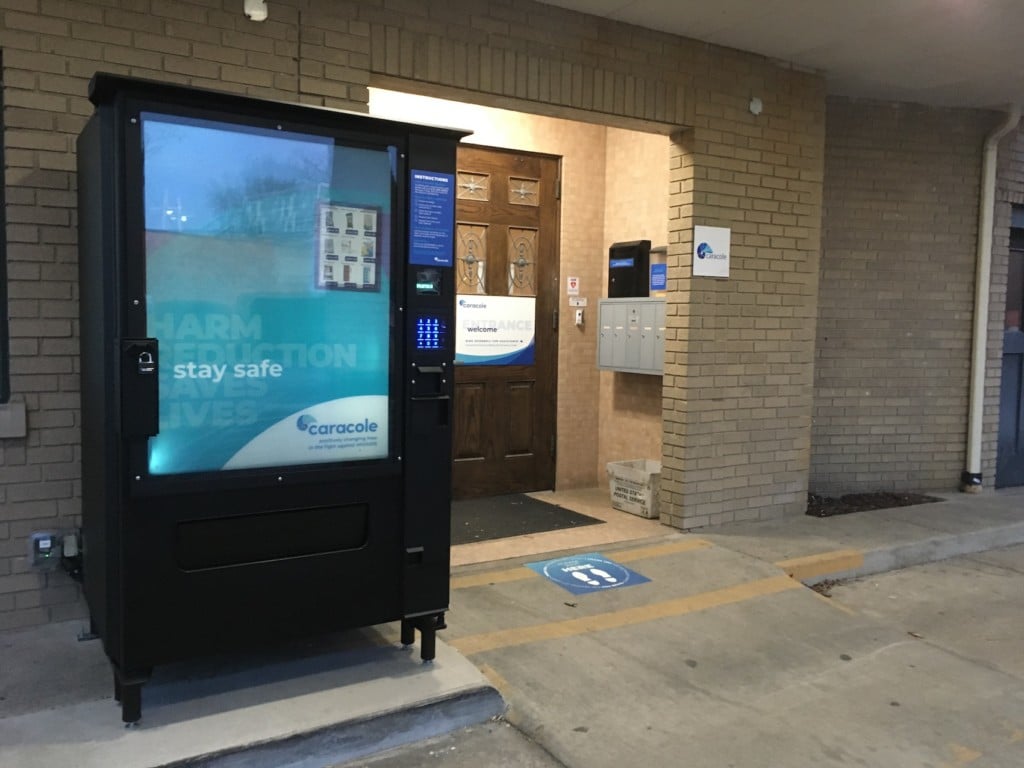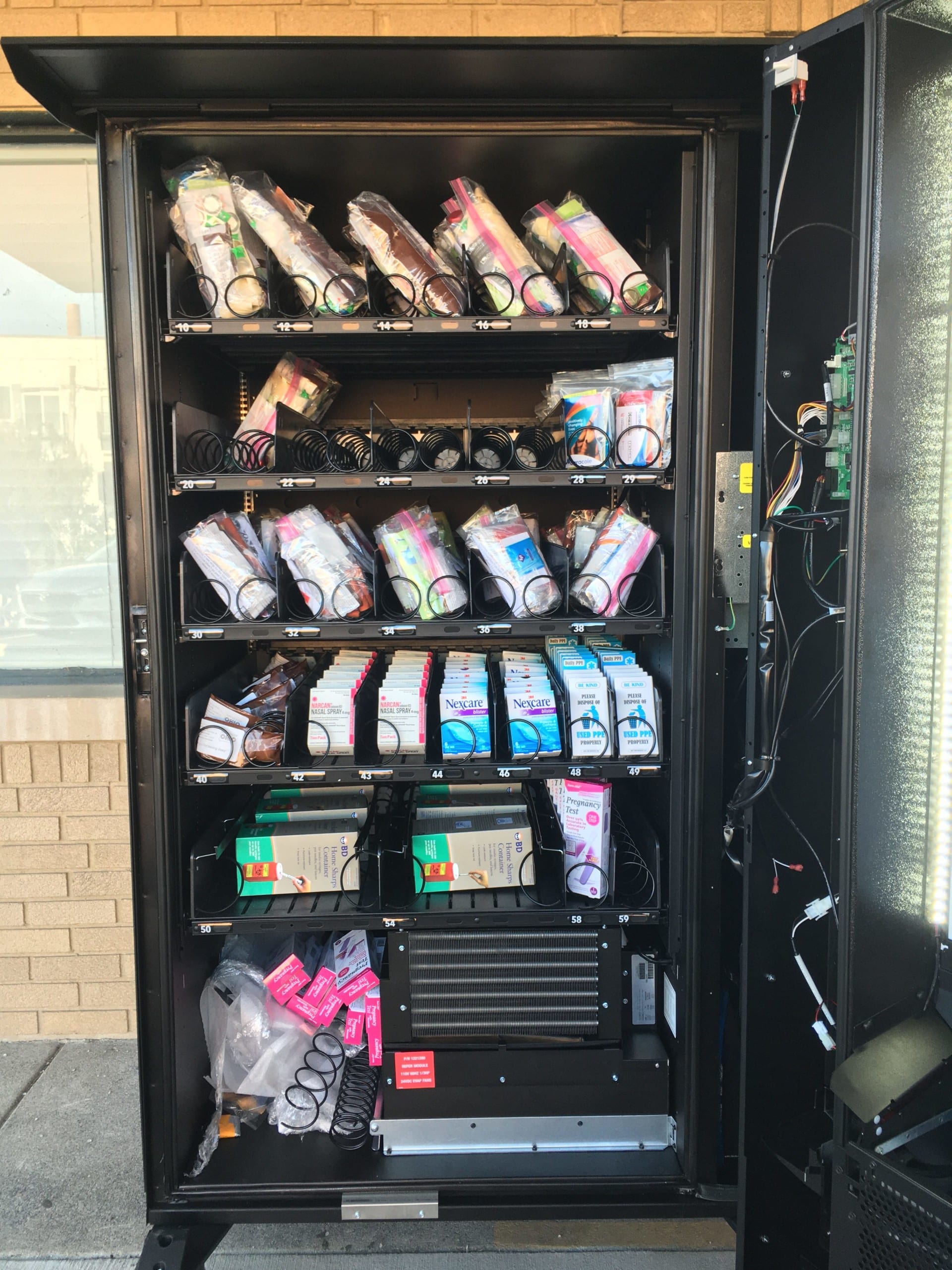
The vending machine tucked behind the rear entrance to Caracole off of Knowlton Street in Cincinnati isn’t your standard variety snack-delivery pit-stop.
The first of its kind in Ohio, the Harm Reduction Supply Machine offers items like Narcan, PPE, safer injection kits, fentanyl test strips, and safer sex kits. As it is discreet, easy-to-use, and contact-less, the goal with the machine is to minimize health risks from activities like drug use and sex in a way that is judgement-free, low-barrier (items are free) and anonymous.
The Buckeye Flame spoke to Suzanne Bachmeyer, Associate Director of Prevention at Caracole, a non-profit AIDS service organization, about how the machine works, who it helps, and why it’s so very important.
Where did the idea for this come from?
A few years ago, our development director, Ellie Singleton, had an idea to make a safer sex vending machine out of an old soda machine. It was just an idea, a dream. And then COVID hit.
A few years before that, we were awarded funding from the Ohio Department of Health to work with HIV negative individuals who inject drugs. When COVID hit, our local syringe service programs — including one we have on site in partnership with Hamilton County Public Health —were closed for four-to-six weeks. We saw the impact that [interruption] had on that community, not being able to get the supplies that they wanted and needed. So we really started talking, on a much more serious level, about getting funding for a machine like this, that would not only include safer sex materials, but also safer use materials. We came across a grant offered by Interact for Health, who awarded us the funding. By the end of March 2021, we had the machine delivered and people started utilizing it end of March/early April.
How do people use the machine and what has the response been?
To register, people need to call a Google Voice number that’s available 24/7 and they are asked a short survey about demographics, what they plan to get from the machine, and whether they need training on Narcan or naloxone. Do they need training on how to use the fentanyl test strips? Are they interested in HIV testing or other resources?
The other way someone can sign up is by coming to our office in person during business hours. We set up a table right in front of the machine so they can register for it and we can show them how to access it. Some of the feedback we’ve heard is that while people are really surprised that it’s legal and that they can do this. They are really thankful for the supplies because there have been supply shortages for things like naloxone. People seem to really love it.
 What is the goal with the machine?
What is the goal with the machine?
The fundamental definition of harm reduction is acknowledging that drug use and other risky behaviors are part of the world and are going to happen. We don’t believe that it is our job to tell anyone what they should or shouldn’t do. The ultimate goal is disease prevention, of course. So if I access the machine, and I never want any other services, we are completely okay with that. On the other side of that is, if someone does want to talk about safer sex on a deeper level, or if someone is interested in treatment, or housing — because we know housing is harm reduction — we are available for them, and we can provide referrals for that service. Whatever that client’s goal is, that’s our goal.
How unique is this?
Las Vegas currently has eight of these machines. When we started planning for this project, we contacted Trac-b Exchange, who were the first people in this country to have harm reduction vending machines. So when we started, we were only the second city in the U.S. to have these. We’ve since met with the New York City health department, people in Seattle, people in Louisville, probably 15 different agencies have come forward and said, “We want to do this. How do we go about doing this?”
Brown County [Ohio] will have one after the first of the year. We are really excited to partner with them and support them in getting a machine, especially in a rural area where there are not a lot of services for people who use drugs.
How does this help folks overcome stigma related to drug use or sex?
I think it helps overcome stigma in a number of ways, just by normalizing drug use and being sex positive: this [activity] is happening, here’s how we can help you access supplies so you can do this in a safer way. I think that’s huge. Just being able to talk about this and allow people to access a service in a very low-barrier way is really important.
There are several communities who are used to having to give their life story to access any sort of service or supplies. So I think making it easily accessible and not necessarily collecting identifying information also helps people who don’t feel comfortable walking into a syringe service program or an HIV service organization. It’s like a tiny foot through the door for them to access what they need and want. Hopefully that will help with engagement in the future, helping to build trust with individuals and letting them know that we are here if and when they’re ready for whatever their needs are.
I just think starting the conversation in a fairly easy and accessible way is really helpful in reducing stigma. Out in the community we’re talking about how we have this machine and people can access these disease prevention supplies. Hopefully that helps reduce stigma as well. People are definitely accessing this machine. It’s incredibly popular. To me that shows that we’re filling a gap, that there is a need.
Any final thoughts you want our readers to know?
We, as a community, have had such a large response to the opioid epidemic. There are services like syringe service programs offered four days a week in Hamilton County. But we all know that there are people who use drugs or people who engage in risky behaviors that don’t access those programs.
So one of our hopes for this machine is that because it is such a low barrier, and because an individual does not have to come and talk to us face to face, that we may be able to meet the needs of someone who’s not comfortable walking into a syringe service program. And that includes communities of color who have been marginalized and mistreated by medical communities. Same with people who use drugs. Our hope is that we will eventually help to meet the needs of those communities as well.
Ignite Action:
- Learn more about the Harm Reduction Supply Vending Machine by going to the Caracole website.
- In partnership with Hamilton County Public Health, Caracole offers harm reduction services and supplies, including new syringes, at our syringe services program on Thursdays from 5:00 – 7:30 PM. To learn more, visit caracole.org/syringe-services.
Know an LGBTQ+ Ohio story we should cover? TELL US!
Submit a story!


